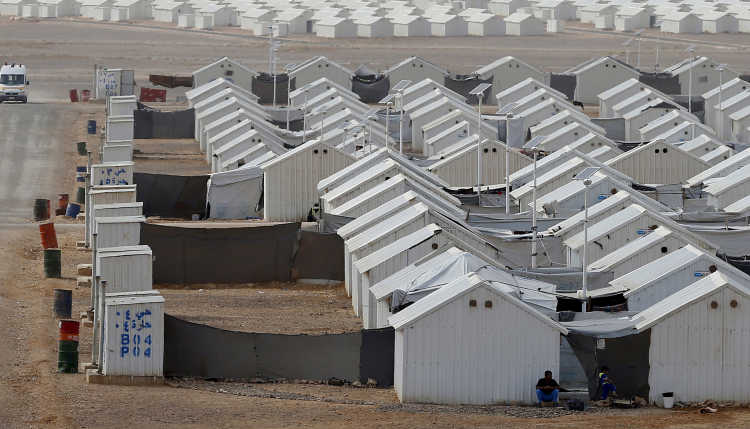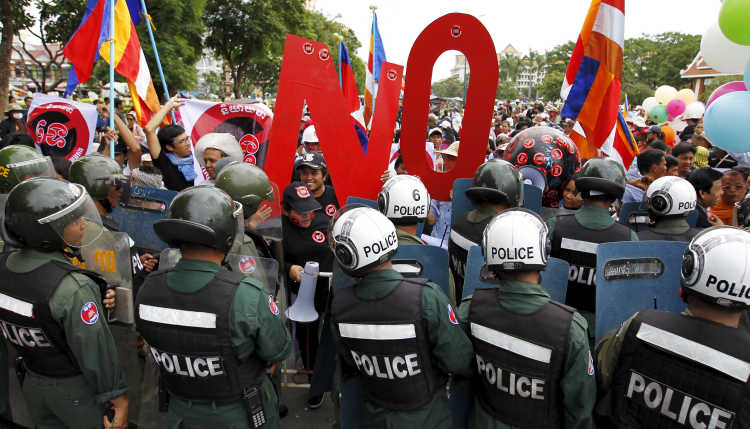- Home
- Publications
- GIGA Focus
- Civil Society Work in China: Trade-Offs and Opportunities for European NGOs
GIGA Focus Asia
Civil Society Work in China: Trade-Offs and Opportunities for European NGOs
Number 6 | 2018 | ISSN: 1862-359X
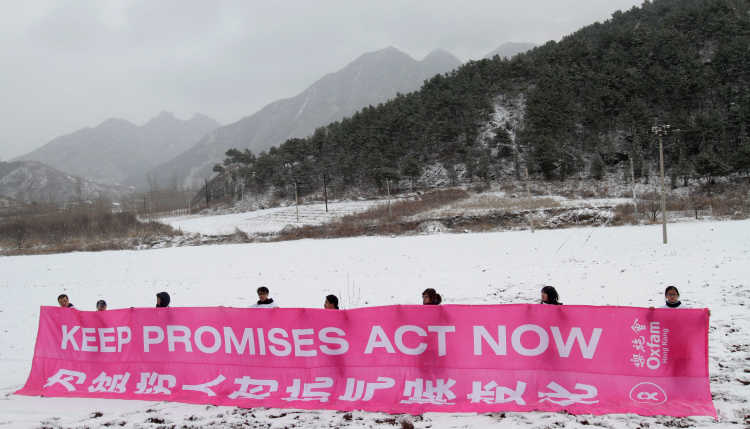
Enacted in January 2017, China’s Foreign Non-Governmental Organisation Management Law (“FNGO Law”) has been interpreted as the clearest evidence of “shrinking spaces” for civil society in China. While the overall trend towards tightened political control and the restriction of independent societal initiatives under Xi Jinping continues unabated, the effects of the new legal environment for non-profits operating in China remain ambiguous.
The new FNGO Law epitomises the Chinese party-state’s securitised and mistrustful approach towards independent social forces – notably those with Western backing – in the “new era.”
However, as opposed to other countries with restrictive NGO laws, Chinese authorities have stopped short of directly attacking or scapegoating NGOs. Instead, they portray the law as a transparency- and service-oriented regulatory improvement that finally grants foreign NGOs legal security.
After two years, 110 European organisations out of a total of 734 have registered offices or carried out “temporary activities” under the law. Finding a Chinese sponsor remains the foremost challenge. But even registered NGOs struggle with onerous reporting burdens and transaction costs.
In conjunction with the Charity Law, the FNGO Law represents an effort to gradually replace foreign funding with domestic donations. But the new legal environment generally favours larger foundations at the expense of smaller, grassroots organisations – be they Chinese or foreign ones.
Policy Implications
China’s FNGO Law is but one piece of a broader shift towards a new governance approach, one that strikes a fragile balance between the openness required for China’s lofty global ambitions and the party-state’s all-encompassing claim to top-down social control. Facing this challenge to liberal, pluralist conceptions of international relations, European engagement with China requires both cooperation and confrontation. Non-profits engaging directly with Chinese counterparts are as important as advocacy-oriented NGOs working on more sensitive issues without the restrictions that come with continued access to mainland China.
Shrinking or Changing Spaces for Civil Society?
International non-governmental organisations (INGOs) have played a considerable role in supporting China’s development, and in strengthening ties between it and Western countries in recent decades. Starting from semi-official exchange programmes between US, German, and British foundations and China’s “mass organisations” in the 1980s, INGO activities later expanded and diversified to include on-the-ground support for the country’s booming grassroots NGO sector. Far from actively supporting systemic opposition to the Chinese Communist Party (CCP), most INGOs have in fact focused on capacity-building in the non-profit and social services sectors. Numerous Chinese government agencies have, equally, relied on international models and expertise in modernising China’s social, health or education policies.
Since the first decade of this century, the work environment for foreign civil society actors has become visibly more difficult. Chinese policy debates on NGOs used to be roughly divided between proponents of a “sinicised” version of (non-confrontational, service-oriented) civil society with important input from Western countries and critics portraying INGOs as a potentially subversive tool of US foreign policy. The latter, security-oriented faction clearly gained traction in the wake of the “Colour Revolutions” in Central Asia – and even more so after the “Arab Spring” revolts. Both were blamed on Western support for grassroots civil society and oppositional social movements. Since Xi Jinping’s ascent to paramount leadership in 2012/2013, the rollback of previous decentralisation efforts within the state and the party apparatus as well as intensified crackdowns on previously tolerated advocacy activities (e.g. by independent unions, women’s rights groups, and human rights lawyers) have intensified the perception of “shrinking spaces” for civic actors in China. The impression that Chinese authorities have come to see foreign NGOs primarily as a security threat is supported by leaked internal documents of the party, which define “civil society” (gongmin shehui) as a “political tool […] adopted by Western anti-China forces” and advocacy as “a serious form of political opposition” (ChinaFile 2013). Widely publicised cases such as Swedish NGO worker Peter Dahlin’s arrest and public parading on state television in early 2016 have contributed to this perception of hostility too.
In this issue, we intend to assess the wider implications of the new institutional environment for foreign as well as domestic non-profit organisations in China. First, we outline the political background to and important formal consequences of new legislation on INGOs active in China. The second section shows how official policy communication surrounding the new FNGO law stands in marked contrast to its restrictive formal stipulations. Then, we ask what can be learned from the law’s actual implementation since early 2017, and put these developments in the larger context of recent changes in the legal and political environment for China’s third sector. In a last step, we turn to European NGOs’ varying responses and coping strategies in this new environment. The paper concludes with an outlook and some recommendations for European non-profits and decision makers.
China’s FNGO Law: Securitising Civil Society Policy
Adopted in April 2016, and enacted in January 2017, the “Law on Administration of Activities of Foreign NGOs in Mainland China” (FNGO Law) has been widely interpreted in Europe and the US as formal evidence of “shrinking spaces” for civil society in China. Although more moderate pilot regulations on FNGO management had previously been launched at the provincial level already, the decisive push for the new national law came from the National Security Commission – one among a number of high-powered organs created at CCP headquarters in 2013, and chaired personally by President Xi. This origin in top security circles explains why regulatory competence for FNGOs was transferred from the Ministry of Civil Affairs (MoCA), responsible for supervising the domestic third sector, to the Ministry of Public Security (MPS) and lower-level Public Security Bureaus (PSBs). In other words, FNGOs in China are now overseen by police authorities – a clear sign of the securitisation of China’s policy towards international civil society.
The new law leaves “foundations, social groups, think tanks and other non-profit, nongovernmental social organizations” (Article 2) legally established outside mainland China two avenues for carrying out legal activities: either by seeking PSB approval for a registered “representative office” or by asking a Chinese partner organisation to file records for “temporary activities” of no more than one year’s duration (Arts. 9–11; 16–17). In addition to imposing onerous reporting requirements (Art. 12) and giving public security incisive “oversight and supervision” competences (Arts. 39–43), the law also subjects international NGOs to the so-called dual registration system. This means that they need to find a Chinese sponsor organisation that “approves” – and thereby effectively vouches for – all of their activities. This system had been the subject of much controversial debate since the 1990s, and is currently being partially abolished for domestic social organisations (Yang, Wilkinson, and Zhang 2016) but simultaneously maintained and tightened as a management tool for FNGOs. The official list of potential supervisory organs, published by the MPS only days before the law’s entry into force, primarily features ministries and government agencies, although it has since been pragmatically expanded to include some social organisations with government backing too. However the lack of incentives as well as the associated risks for would-be sponsors turned this dual registration requirement into the main obstacle to registration faced, particularly by smaller NGOs with only limited administrative resources.
Further restrictive measures in the FNGO Law (Pissler 2016) – such as the prohibition to engage in or fund “political activities” of any kind (Art. 5), or the possibility of detaining FNGO staff for supporting advocacy work (worded as “inciting resistance to laws and regulations” or “spreading rumours,” Art. 47) – are best understood as an explicit legalisation of previously informal (but nonetheless real) state powers to control and potentially intimidate foreign and Chinese NGO staff alike.
Making Sense of China’s “Soft” Communication on a “Hard” Law
Despite the FNGO Law’s origins in state security circles, official policy communication in the party-state media has broadly refrained from the public scapegoating strategy very common in other countries that have similarly passed restrictive laws on foreign civil society – such as Russia, Venezuela, and Hungary. Instead, the official line has been to emphasise the generally positive contribution of INGOs to China’s development. In support of this soft framing, the law promises rewards to FNGOs that make “outstanding contributions to the development of China’s public welfare sector” (Art. 8), while the entirety of chapter IV is dedicated to “facilitation measures” for “NGOs working in accordance with the law” (Art. 33) – including tax incentives and other preferential policies (Art. 36).
A second strategy to fend off international criticism has been to justify the FNGO Law on the grounds that it represents an effort to fight “offshore” and “fake” organisations that use the shell of a non-profit organisation to swindle Chinese donors (Sidel 2016). This is a real problem in China, and one that has seriously eroded public trust in charities. As such, this approach has allowed the Chinese party-state to present the FNGO Law as part of a wider anti-fraud campaign, one aimed at increasing “trust” in the third sector by promoting better regulation and increasing transparency and accountability.
Ceremonial registration events for “successful” FNGOs and regular positive media reports suggest a friendly, service-oriented attitude towards foreign organisations. PSBs, which had no previous experience in managing non-profits, have organised workshops for FNGO representatives throughout the country to address questions about the many uncertainties surrounding the interpretation and implementation of the new law. INGO communication also contributes to this positive image: while several INGO leaders have agreed to share their “registration stories” in public, these accounts mostly strike a positive undertone and therefore support the official Chinese narrative about “rule-of-law” and increased transparency. Other INGOs that may have, or are experiencing, more trouble shy away from public statements or even from making complaints, for obvious reasons.
Two Years On: FNGO Law Implementation and Registration Experiences
Obtaining a representative picture of INGO experiences with the new law remains difficult. While the official registration data provided by the MPS is arguably more comprehensive than any available information on foreign NGO activities in China prior to 2017, one obvious limitation is its bias towards successfully registered organisations. Actually, the 734 organisations that have established representative offices or carry out temporary activities under the FNGO law to date likely represent less than 10 per cent of all foreign NGOs present in China before the legislation’s enactment. How many among the remaining 90 plus per cent have seized or suspended their activities in China, continue to operate without registration, or are currently still trying to register remains unknown. While no official instances of the denial of registration have been made public, many smaller NGOs simply fail to find a Chinese sponsor and to navigate the bureaucratic maze accompanying registration.
While private accounts by FNGO staff largely confirm the officially propagated positive and helpful attitude of PSB officials, they also suggest considerable differences and inconsistencies regarding the interpretation of several vaguely worded clauses. For instance, Art. 21 prevents FNGOs from “fundraising within mainland China” and thereby supports the idea that foreign actors are destined to be phased out gradually – with the hope that domestic charities will take over as the main funders of philanthropic activities. But FNGO experiences suggest vast implementation differences at the regional and local levels, depending on the particular supervisory authority and NGO at hand. While some tax offices accept (formally) unsolicited donations by FNGOs within mainland China, others prohibit their acceptance – be it out of ignorance of the law’s details, or of a wish to keep on the safe side in light of the central leadership’s unabated anti-corruption efforts.
The inconsistent implementation practice reflects the uncertainty among China’s bureaucrats responsible for implementing such a law without adequate preparation. At the same time, it testifies to bureaucratic wrangles between parts of the administration keen on restraining the influence of foreign actors on China’s society on the one hand, and those eager to continue established working relationships at local level on the other. The latter camp includes those who are eager to learn from international experiences while promoting the “globalisation” of China’s own social organisations – a policy known as “welcoming in so that China can step out” (Jia 2016). Overall, the enactment of China’s first law on foreign NGOs has not changed the fact that any civil society activity basically remains subject to political goodwill of involved actors rather than depending on formal-legal details.
Gradually Replacing Foreign with Domestic NGOs, and Smaller with Larger Ones
The shifting role of INGOs in the eyes of Chinese authorities also needs to be placed in the context of the latter’s parallel effort to promote the “healthy development” of domestic charities, thereby making up for a decline in foreign aid to China’s social service sector. Thus China’s Charity Law, which was passed only one month ahead of the FNGO Law in 2016, was mostly positively received within China’s third sector and academic community, as it has the potential to give Chinese foundations an additional legal basis to operate and engage in public fundraising. This further substantiates the Chinese government’s “import substitution” plans for the third sector.
The “smooth” replacement of foreign with domestic third sector funding, however, is currently being hindered in two ways: For one thing, most Chinese foundations still lack the capacity and experience to build donor–grantee relationships with smaller NGOs. They often favour running their own projects, with a strong preference for highly visible, one-off activities over long-term ones with a sustainable social impact (Shieh 2017). Second, even for organisations working in ”non-sensitive”, politically condoned fields such as poverty alleviation, education, or healthcare, the regulatory environment is proving much less enabling than initially hoped for. New “Draft Regulations on Social Organisation Management” issued by the MoCA in August 2018 fell short of many people’s expectations, and even threaten to further raise registration thresholds for foundations – although they do also promise to lift the onerous dual registration requirement for certain politically supported activities (e.g. natural science exchanges, social service delivery). Consequently, despite the strict legal differentiation between overseas and domestic civil society organisations, the government’s tendency to favour larger foundations – whose operations can be more easily supervised – over smaller NGOs and less formalised grassroots citizen initiatives applies to Chinese and international actors alike.
The law’s wording also suggests that the Chinese term for “NGO” (fei zhengfu zuzhi) now exclusively refers to foreign organisations from “developed” countries. For one thing, with the whole “civil society” concept having turned into a taboo subject from 2013, domestically Chinese organisations are no longer referred to as “non-governmental” – but, instead, as “social organisations” (shehui zuzhi). Second, virtually all foreign organisations now registered under the FNGO Law (apart from industry associations) come from “Western” countries (plus Japan and South Korea). This Western bias is most obvious when focusing on the 110 unique European organisations with registered activities under the FNGO Law (cf. Figure 1).
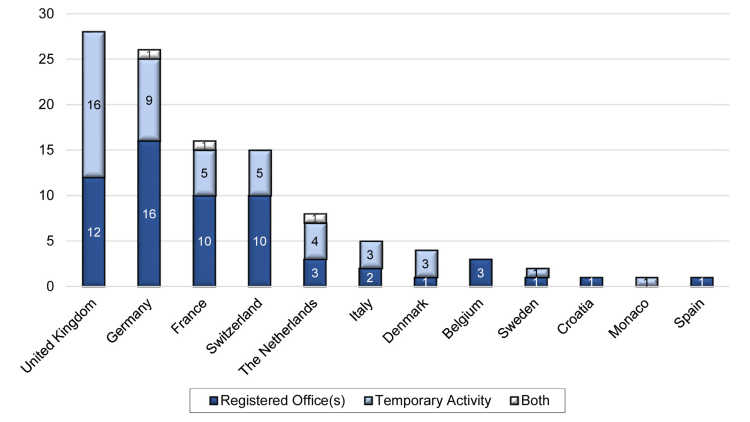
This absence of non-Western European organisations may appear surprising in light of China’s intense diplomatic efforts to promote relations including “people-to-people ties” with Central and Eastern European countries under the 16+1 format. From a Chinese foreign policy viewpoint, however, it makes sense as these countries are categorised as falling under the umbrella of its “Belt and Road Initiative” (BRI), and thus as partners in (non-competitive) “South–South relations.” As such, China’s relations with these countries are governed by a different logic than those with Western liberal democracies.
European NGOs’ Coping Strategies, Trade-Offs and Opportunities
From a European policy perspective, the new legal and political environment for non-profit work in China presents a number of challenges. Following a brief review of current coping strategies and potentially emerging opportunities for European civil society actors, this section will then present some strategic reflections for further societal engagement both with and in China.
First, it should be noted that for many the FNGO Law has not turned out to be as much of a watershed in their China-related activities as initially expected. In fact, many FNGOs report continuity before and after 2017, since the FNGO Law’s oppressive potential has been scarcely manifested. Generally, non-profits already registered with the MoCA under previous regulations and those with a long tradition of carrying out social programmes with tangible benefits for local authorities have found it easier to accommodate the new framework. In turn, the political environment for activities in “sensitive” fields and advocacy work more generally had already been in decline for almost a decade – forcing many foreign non-profits to end or reorient their China programmes. For those organisations directly affected by the law – mostly because they had previously operated in politically tolerated grey areas without formal registration or being registered as companies – three strategies can be observed to date:
Redirecting Activities to Politically Welcome Fields
The first and most common strategy among larger INGOs and foundations has been to focus or redirect their China-related activities towards fields that are explicitly given “legal protection” under the FNGO Law, thereby supporting official Chinese policy goals for socio-economic development. In a comparison of MPS registration statistics with publicly available data on Foreign NGO activities prior to 2017, Batke and Hang (2018) found supporting evidence for the growing alignment of registered FNGOs with government priorities for social work – namely, regarding disaster relief, education, health, and youth. European NGOs follow a similar trend, albeit with a stronger-than-average focus on “Technology” and “Law and Governance” (cf. Figure 2).
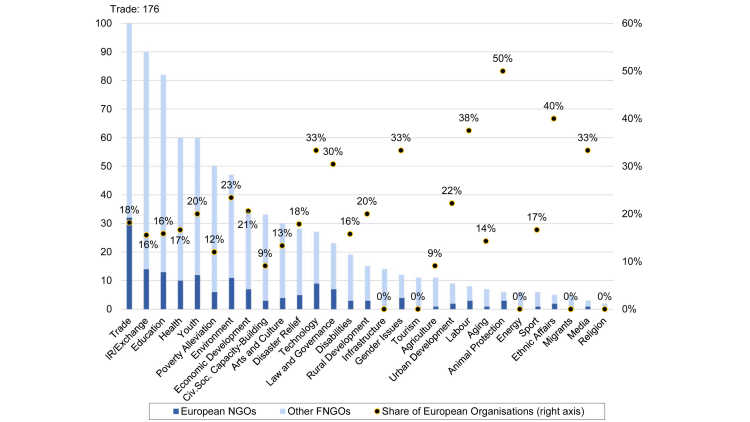
Environmental protection also continues to be popular, as it is one of the few fields in which somewhat autonomous Chinese non-profits are still able to develop and perform meaningful work. While civil society work is not officially endorsed in this area, most projects can be said to contribute to the central government’s ambitious objectives in terms of fighting environmental degradation, air and soil pollution, as well as climate change. Together with youth exchanges, it is also an area in which the European Union and China share a clear political interest in deepening cooperation.
In addition to officially declared fields of activity, more and more INGOs are starting to present their activities as contributing to Xi’s touted BRI – in an effort to ease bureaucratic approval and boost Chinese buy-in. In this sense, they complement the growing efforts of Chinese “NGOs” (many of them with a strong government background) to “sing the China story” internationally, and thereby insert key terms of official CCP ideology – such as “Belt and Road”, “win-win cooperation”, or the “Community of Shared Future for Mankind” – into the lexicon of United Nations fora.
Continuing to Operate Without Formal Registration
Carrying out third sector activities without FNGO Law registration appears to be an option for two diametrically opposed reasons. On the one side, government-organised NGOs (“GONGOs”) from non-Western countries often engage in activities that the Chinese government classifies as “strengthening people-to-people ties” along the BRI. The scarcity of FNGO offices or even temporary activity registration from BRI countries suggests that these activities – including student exchanges, non-governmental delegation visits, or scholarship programmes – are not expected to be brought under the securitised framework of the FNGO Law. More akin to “Track-Two Diplomacy” than to transnational civil society, these exchanges represent a new model for promoting the societal component of Chinese foreign policy in the earlier-mentioned South–South relations.
On the other side of the spectrum, meanwhile, many smaller NGOs without governmental support have been either unable or unwilling to comply with the now mandatory legal framework. They thus continue to operate in the something of a grey area that has characterised much of foreign civil society work in China for decades now. While this may be the only viable strategy for organisations engaged in sensitive fields (defined and prohibited under the FNGO Law as “political activities”), it also bears incalculable risks for employees and Chinese partners alike.
Suspending Activities in Mainland China
Almost two years into the FNGO Law era, only 340 organisations have successfully established a permanent representative office so far. The question of how many non-profit organisations have internally decided to leave China and how many are still trying to register or return to the country after a temporary suspension remains a difficult one to answer. While several advocacy groups are already working from Hong Kong or Taipei, European NGOs with previous activities on the mainland have generally been prudent with public statements about their China strategies. A wait-and-see approach with a silent suspension of China-related activities is most feasible for multilaterally oriented INGOs without permanent staff and with clear alternatives in neighbouring countries, while the choice is much harder for those with a long-term China commitment and established trust relationships on the ground. Nearing the FNGO Law’s third year of implementation, the question will be whether Chinese authorities continue to tolerate non-registered organisations or start to truly force out those that have not managed to find a willing sponsor or partner organisation.
Chinese Norm-Shaping Ambitions
While many foreign NGOs do formally continue to operate in China within the new legal environment, the overall political climate has become much more difficult to navigate for both Chinese and foreign civil society actors. This contradicts the official “rule-of-law” narrative initially used to justify the FNGO Law’s promulgation. Despite inconsistent implementation, the FNGO Law so far appears to achieve an important government objective: crowding out potentially disruptive advocacy organisations while directing other FNGOs towards government-supported policy fields.
Another purported objective, of increasing the transparency of foreign NGO work in China, appears to have partially materialised for the (still relatively few) registered organisations. The gradual replacement of foreign with Chinese philanthropic funding for China’s social sector is still impeded by structural deficiencies, legal obstacles, and a lack of public trust in the domestic charity sector. These circumstances conspire to leave many smaller Chinese NGOs in the lurch.
Finally, Chinese perspectives on the third sector are also rapidly expanding from a purely domestic focus towards taking into consideration the impact of international civil society on China’s image and policy interests. As Chinese non-profits are now required to “go out” and carry “China’s good voice” into the world through charity and international cooperation (Liu 2016), the Chinese leadership cannot simply build legal walls to shut out all foreign civil society influences. More generally, China heavily relies on international cooperation to strengthen its own norm-projection capacities in the long run. Notably, public opinion in BRI target countries has emerged as a prominent concern of Chinese intellectuals and policymakers since Xi Jinping advanced the concept of minxin xiangtong (literally “letting the peoples’ hearts communicate,” officially translated as “strengthening people-to-people ties”) in his keynote address at the Belt and Road Forum in May 2017. The Chinese leadership’s ambition to build a social basis for the BRI and thereby use social organisations to improve public opinion in target countries adds another dimension to China’s policy towards non-profit organisations. Within this new framework, INGOs can be useful as partners and facilitators for Chinese organisations in their endeavouring to “go out” and contribute to the “smooth construction of the Belt and Road” – provided that they neatly conform with Chinese government policies and related slogans.
At the same time, these international ambitions – which are prominently voiced in foreign policy circles – also reveal the internal contradictions in China’s civil society policies. Eventually, the “people-to-people” rhetoric needs at least some credible basis in the form of non-governmental exchanges. This is a requirement that appears difficult to reconcile with the leadership’s current approach to regulating the non-profit sector, which currently remains heavily focused on micro-management and top-down control.
Difficult Trade-Offs and Remaining Opportunities for European NGOs
The institutional environment for both foreign and domestic civic actors in China has changed significantly over the past decade, and most thoroughly over the past two years. This has accentuated a long-existing dilemma for international non-profits, which face an increasingly difficult trade-off between playing by China’s rules and opting out altogether. To officially continue operations in China means complying with the new institutional rules, accepting tightened supervision by Chinese sponsors and security personnel, renegotiating one’s own agenda to fit the official line, and maybe sacrificing certain values and principles in exchange for access – as well as for the pragmatic benefit of not burning bridges. On the other hand, exiting mainland China to avoid the costs of compliance, or the risk of compromising one’s own agenda and credibility among international supporters, also means losing touch with developments on the ground, severing ties with China’s still vibrant society, and potentially putting an end to projects valuable to many people.
The assessment of this trade-off will, of course, yield different outcomes depending on the issue area at hand. In sectors such as poverty alleviation, social security, or healthcare services, but also environmentalism and climate change mitigation, chances are good that meaningful activities will remain possible. If international non-profits are ready to comply with the formal rules of registration and reporting, they should not face too onerous burdens or pressures to compromise on their agendas. In other issue areas such as human and labour rights, religious and ethnic issues, or legal assistance to vulnerable social groups – which are perceived by the Chinese party-state as potential challenges to regime legitimacy – a thorough cost–benefit analysis might suggest that it is wiser to opt out entirely. For some Western civil society actors, the forced end to their activities in China could liberate them from self-imposed restraints, and thus strengthen critical voices and advocacy work in Western countries themselves.
With these differentiations in mind, European NGOs should be clear about potential hazards in their work and do sober longer-term analyses of the costs and benefits involved in continued activity within China’s new institutional environment. From a policy perspective, European decision makers urgently need to strengthen their commitment to meaningful civil society exchanges and work against the further “GONGOisation” of the people-to-people pillar of EU–China relations. This would be possible, for example, by protecting the diversity of civil society participants from both Europe and China (Fulda in press). Meanwhile, the internationalisation and growing global impact of China’s own (albeit often state-backed) social organisations also opens up new areas for potential cooperation and engagement on global governance issues, or for the promotion of the UN Sustainable Development Goals – which also figure prominently in contemporary Chinese philanthropy debates.
In times of serious challenges to the liberal international order, Europe’s strength continues to lie in the diversity of actors and plurality of voices involved in its foreign policy and international relations. Upholding this diversity requires both European non-profits that strive for continued civil society engagement and cooperation with China and also NGOs that dare to speak up and inform the European public about critical aspects of China’s “alternative” model – and growing global impact.
Footnotes
References
Batke, Jessica, and Chen Qi Hang (2018), Has the Foreign NGO Law Changed the Work of Foreign NGOs in China?, in: ChinaFile, 10 January, www.chinafile.com/ ngo/analysis/has-foreign-ngo-law-changed-work-of-foreign-ngos-china (20 November 2018).
ChinaFile (2013), Document 9: A ChinaFile Translation. How Much Is a Hardline Party Directive Shaping China’s Current Political Climate?, 8 November, www. chinafile.com/document-9-chinafile-translation (30 November 2018).
Fulda, Andreas (in press), The Emergence of Citizen Diplomacy in EU-China Relations: Principles, Pillars, Pioneers, Paradoxes, in: Diplomacy and Statecraft, 30, University of Nottingham.
Jia, Xijin (2016), 立法境外NGO, 第二只靴子如何落? [Legislations for Foreign NGOs; How Will the Second Boot Land?], in: Caijing/China Development Brief, 14 April, www.chinadevelopmentbrief.cn/articles/legislations-for-foreign-ngoshow-will-the-second-boot-land/ (1 December 2018).
Liu, Bo (2016), 中国基金会“走出去”的趋势与现状 [Trends and Current State of Chinese Foundations “Going out”], in: China Development Brief, www.chinadevel opmentbrief.org.cn/news-18448.html (1 December 2018).
Pissler, Knut B. (2016), Foreign NGOs in China Revisited: Zwischen Zivilgesellschaft und Überwachungsstaat, in: Zeitschrift für Chinesisches Recht, 23, 2.
Shieh, Shawn (2017), Same Bed, Different Dreams? The Divergent Pathways of Foundations and Grassroots NGOs in China, in: Voluntas, 28, 4, 1785–1811.
Sidel, Mark (2016), China: The Overseas NGO Law Returns, With a New Strategy, in: Alliance Magazine, 22.
Yang, Yongjiao, Mick Wilkinson, and Xiongxiong Zhang (2016), Beyond the Abolition of Dual Administration. The Challenges to NGO Governance in 21st Century China, in: Voluntas, 27, 5, 2292–2310.
General Editor GIGA Focus
Editor GIGA Focus Asia
Editorial Department GIGA Focus Asia
Regional Institutes
Research Programmes
How to cite this article
Lang, Bertram, and Heike Holbig (2018), Civil Society Work in China: Trade-Offs and Opportunities for European NGOs, GIGA Focus Asia, 6, Hamburg: German Institute for Global and Area Studies (GIGA), https://doi.org/10.1000/182
Imprint
The GIGA Focus is an Open Access publication and can be read on the Internet and downloaded free of charge at www.giga-hamburg.de/en/publications/giga-focus. According to the conditions of the Creative-Commons license Attribution-No Derivative Works 3.0, this publication may be freely duplicated, circulated, and made accessible to the public. The particular conditions include the correct indication of the initial publication as GIGA Focus and no changes in or abbreviation of texts.
The German Institute for Global and Area Studies (GIGA) – Leibniz-Institut für Globale und Regionale Studien in Hamburg publishes the Focus series on Africa, Asia, Latin America, the Middle East and global issues. The GIGA Focus is edited and published by the GIGA. The views and opinions expressed are solely those of the authors and do not necessarily reflect those of the institute. Authors alone are responsible for the content of their articles. GIGA and the authors cannot be held liable for any errors and omissions, or for any consequences arising from the use of the information provided.







